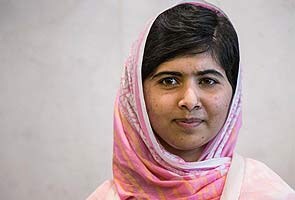
File photo of teen activist Malala Yousafzai
London:
Malala Yousafzai, the Pakistani schoolgirl shot by the Taliban last year for campaigning for girls' education, said on Monday she hoped to become a politician to "change the future of my country".
The 16-year-old, whose continued fight for all children to go to school has made her a favourite for the Nobel Peace Prize this week, also backed dialogue with the Taliban, although she said this was an issue for the government.
"I will be a politician in my future. I want to change the future of my country and I want to make education compulsory," Malala said in a BBC interview.
She added: "The best way to solve problem and to fight against war is through dialogue, and is through peaceful way.
"But for me the best way to fight against terrorism and extremism is a simple thing -- educate the next generation."
She added that issues of terrorism are "not an issue for me, that's the job of the government.. and that's also the job of America".
Malala dismissed the continued threats against her life and repeated her desire to return to Pakistan from Britain, where she was flown for treatment after the attack in October and where she now goes to school.
"The bad thing in our society and in our country is that you always wait for someone else to come," Malala said.
"If I'm saying that there is no-one who is doing anything for education, if I say there is no electricity, there is no natural gas, the schools are being blasted, and I'm saying no-one is doing this, why don't I go for it, why don't I do this?
"I believe that I will achieve this goal because Allah is with me, God is with me and he saved my life."
Malala admitted Britain had been a culture shock, "especially for my mother because we had never seen that women would be that much free -- they would go to any market, they would be going alone with no men, no brothers and fathers".
She said: "I'm not becoming western, I'm still following my own culture, the Pashtun culture."
The 16-year-old, whose continued fight for all children to go to school has made her a favourite for the Nobel Peace Prize this week, also backed dialogue with the Taliban, although she said this was an issue for the government.
"I will be a politician in my future. I want to change the future of my country and I want to make education compulsory," Malala said in a BBC interview.
She added: "The best way to solve problem and to fight against war is through dialogue, and is through peaceful way.
"But for me the best way to fight against terrorism and extremism is a simple thing -- educate the next generation."
She added that issues of terrorism are "not an issue for me, that's the job of the government.. and that's also the job of America".
Malala dismissed the continued threats against her life and repeated her desire to return to Pakistan from Britain, where she was flown for treatment after the attack in October and where she now goes to school.
"The bad thing in our society and in our country is that you always wait for someone else to come," Malala said.
"If I'm saying that there is no-one who is doing anything for education, if I say there is no electricity, there is no natural gas, the schools are being blasted, and I'm saying no-one is doing this, why don't I go for it, why don't I do this?
"I believe that I will achieve this goal because Allah is with me, God is with me and he saved my life."
Malala admitted Britain had been a culture shock, "especially for my mother because we had never seen that women would be that much free -- they would go to any market, they would be going alone with no men, no brothers and fathers".
She said: "I'm not becoming western, I'm still following my own culture, the Pashtun culture."
Track Latest News Live on NDTV.com and get news updates from India and around the world

